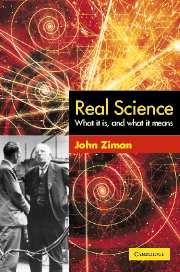Book contents
- Frontmatter
- Contents
- Preface
- 1 A peculiar institution
- 2 Basically, it's purely academic
- 3 Academic science
- 4 New modes of knowledge production
- 5 Community and communication
- 6 Universalism and unification
- 7 Disinterestedness and objectivity
- 8 Originality and novelty
- 9 Scepticism and the growth of knowledge
- 10 What, then, can we believe?
- Endnotes
- Bibliography and author index
- Index
3 - Academic science
Published online by Cambridge University Press: 24 August 2009
- Frontmatter
- Contents
- Preface
- 1 A peculiar institution
- 2 Basically, it's purely academic
- 3 Academic science
- 4 New modes of knowledge production
- 5 Community and communication
- 6 Universalism and unification
- 7 Disinterestedness and objectivity
- 8 Originality and novelty
- 9 Scepticism and the growth of knowledge
- 10 What, then, can we believe?
- Endnotes
- Bibliography and author index
- Index
Summary
The republic of learning
Academic science is the stereotype of science in its purest form. When people talk about scientific research (as distinct from technology) they primarily have in mind the sort of scientific work that is done in universities. They think of it as the characteristic activity of members of a particular social group in a particular social frame.
Scientists themselves insist that they belong to a community, indicating that they recognize each other as people who share many values, traditions and goals. But this community is essentially notional. The word is used to mean ‘all those people who subscribe to certain general principles of rationality and objectivity, and have such high standards of expertise and mutual trust that they can be relied upon to work together for the benefit of humanity in the attainment of truth’. On the one hand, it proclaims the unity of this group within society at large. On the other hand, it asserts that its members are individuals who are linked together voluntarily by their common attitude to learning and research.
The concept of a scientific community is part of the traditional philosophical Legend. At the same time, however, it encases science in a sociological ‘black box’, whose internal structure is deemed to be irrelevant to the pursuit of knowledge. Indeed, the power of the Legend lingers on, even amongst the champions of a ‘sociology of scientific knowledge’.
- Type
- Chapter
- Information
- Real ScienceWhat it Is and What it Means, pp. 28 - 55Publisher: Cambridge University PressPrint publication year: 2000
- 1
- Cited by



